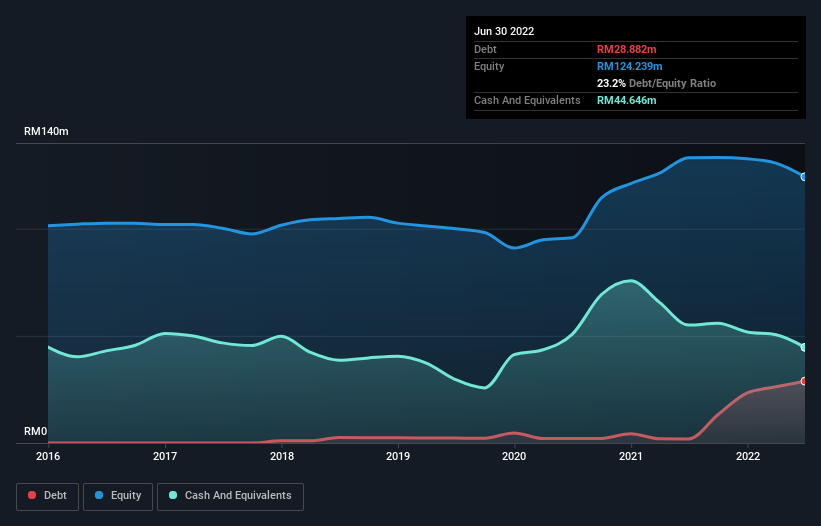
David Iben put it well when he said, 'Volatility is not a risk we care about. What we care about is avoiding the permanent loss of capital.' So it might be obvious that you need to consider debt, when you think about how risky any given stock is, because too much debt can sink a company. As with many other companies G Capital Berhad (KLSE:GCAP) makes use of debt. But is this debt a concern to shareholders?
When Is Debt A Problem?
Generally speaking, debt only becomes a real problem when a company can't easily pay it off, either by raising capital or with its own cash flow. If things get really bad, the lenders can take control of the business. However, a more common (but still painful) scenario is that it has to raise new equity capital at a low price, thus permanently diluting shareholders. Of course, debt can be an important tool in businesses, particularly capital heavy businesses. When we think about a company's use of debt, we first look at cash and debt together.
Check out the opportunities and risks within the MY Transportation industry.
What Is G Capital Berhad's Debt?
As you can see below, at the end of June 2022, G Capital Berhad had RM28.9m of debt, up from RM1.92m a year ago. Click the image for more detail. But it also has RM44.6m in cash to offset that, meaning it has RM15.8m net cash.

How Healthy Is G Capital Berhad's Balance Sheet?
Zooming in on the latest balance sheet data, we can see that G Capital Berhad had liabilities of RM20.8m due within 12 months and liabilities of RM32.3m due beyond that. Offsetting this, it had RM44.6m in cash and RM15.1m in receivables that were due within 12 months. So it actually has RM6.64m more liquid assets than total liabilities.
This short term liquidity is a sign that G Capital Berhad could probably pay off its debt with ease, as its balance sheet is far from stretched. Simply put, the fact that G Capital Berhad has more cash than debt is arguably a good indication that it can manage its debt safely. The balance sheet is clearly the area to focus on when you are analysing debt. But it is G Capital Berhad's earnings that will influence how the balance sheet holds up in the future. So if you're keen to discover more about its earnings, it might be worth checking out this graph of its long term earnings trend.
In the last year G Capital Berhad wasn't profitable at an EBIT level, but managed to grow its revenue by 32%, to RM15m. Shareholders probably have their fingers crossed that it can grow its way to profits.
So How Risky Is G Capital Berhad?
We have no doubt that loss making companies are, in general, riskier than profitable ones. And the fact is that over the last twelve months G Capital Berhad lost money at the earnings before interest and tax (EBIT) line. Indeed, in that time it burnt through RM30m of cash and made a loss of RM8.1m. With only RM15.8m on the balance sheet, it would appear that its going to need to raise capital again soon. G Capital Berhad's revenue growth shone bright over the last year, so it may well be in a position to turn a profit in due course. By investing before those profits, shareholders take on more risk in the hope of bigger rewards. There's no doubt that we learn most about debt from the balance sheet. But ultimately, every company can contain risks that exist outside of the balance sheet. To that end, you should learn about the 3 warning signs we've spotted with G Capital Berhad (including 1 which is a bit concerning) .
Of course, if you're the type of investor who prefers buying stocks without the burden of debt, then don't hesitate to discover our exclusive list of net cash growth stocks, today.
If you're looking to trade G Capital Berhad, open an account with the lowest-cost platform trusted by professionals, Interactive Brokers.
With clients in over 200 countries and territories, and access to 160 markets, IBKR lets you trade stocks, options, futures, forex, bonds and funds from a single integrated account.
Enjoy no hidden fees, no account minimums, and FX conversion rates as low as 0.03%, far better than what most brokers offer.
Sponsored ContentNew: Manage All Your Stock Portfolios in One Place
We've created the ultimate portfolio companion for stock investors, and it's free.
• Connect an unlimited number of Portfolios and see your total in one currency
• Be alerted to new Warning Signs or Risks via email or mobile
• Track the Fair Value of your stocks
Have feedback on this article? Concerned about the content? Get in touch with us directly. Alternatively, email editorial-team (at) simplywallst.com.
This article by Simply Wall St is general in nature. We provide commentary based on historical data and analyst forecasts only using an unbiased methodology and our articles are not intended to be financial advice. It does not constitute a recommendation to buy or sell any stock, and does not take account of your objectives, or your financial situation. We aim to bring you long-term focused analysis driven by fundamental data. Note that our analysis may not factor in the latest price-sensitive company announcements or qualitative material. Simply Wall St has no position in any stocks mentioned.
About KLSE:GCAP
G Capital Berhad
An investment holding company, provides transportation services in Malaysia.
Adequate balance sheet low.


